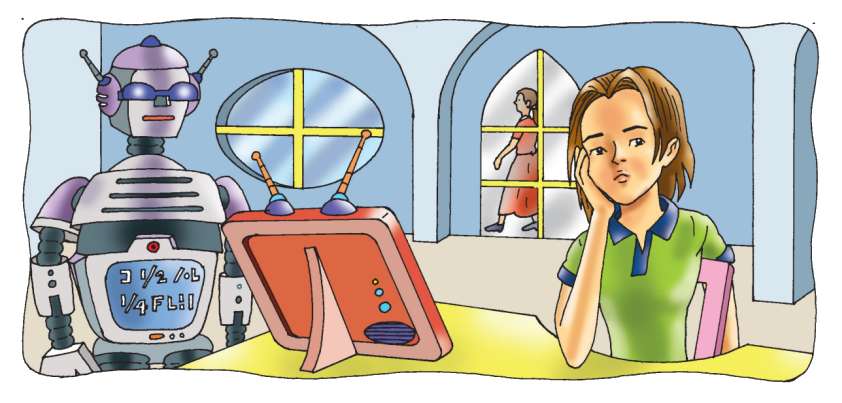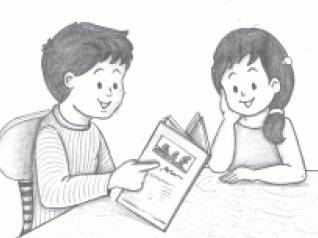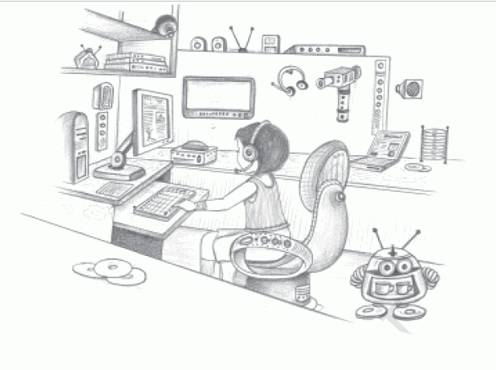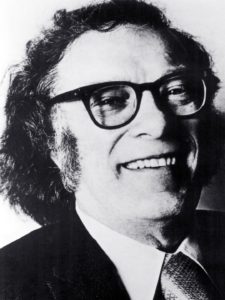Lesson-1
The Fun They Had
By Isaac Asimov

The Fun They Had Introduction
This is a lighthearted storey. It takes place in the future. It will make you all fall in love with school. This storey is about school life and how children who do not get to school miss out on school. The storey is set in the future, when there may be no school and no books. Now imagine how those students will miss going to school and how they will feel that their forefathers, the current generation—you all—had fun going to school, meeting and helping one another. Finally, we learn that this is the imagination of a young girl named Margie, who discovers that their forefathers used to go to school and that all the children used to study together. She believes that they all had a good time at school. So, after reading the storey, we feel that school life is very good, and we are fortunate to have real schools where we can go, meet friends, and study together.
The Fun They Had Summary
The storey begins with Margie writing in her diary about an old book found by Tommy. Margie was reminded of her grandfather, who once told her about his grandfather, who went to a real school where the students were taught by actual teachers.
However, Margie and Tommy lived in the year 2157, in a future world where education was completely computerised. They did not attend school. Instead, they had a special study room where they were taught by a computer. The computer teacher was programmed and adjusted to meet the individual needs of each child. Occasionally, the computer teacher created flaws that were corrected by a County Inspector.
Tommy and Margie were both puzzled by the book Tommy found in his attic. They were perplexed as they read books on their computer teacher's screen. Margie found the computer teacher to be boring, and she disliked the mechanical teaching and learning. She also wondered how enjoyable it would be to study in a school. Studying in a fun environment, with other children, and with a human teacher.
The Fun They Had Lesson Explanation
MARGIE even wrote about it that night in her diary. On the page headed 17 May 2157, she wrote, “Today Tommy found a real book!”
Margie is the story's main character. She is an 11-year-old girl. On the night of May 17, 2157, she keeps a diary. (Right now, we are in the year 2022.) As previously stated, the story is set in the future, in the year 2157 (almost a century and a half, or 140 years from now). Margie writes an entry in her diary at the time, stating that 'Tommy found a real book,' which she finds strange because real books do not exist in her time. They only have electronic books, or virtual books.
It was a very old book. Margie’s grandfather once said that when he was a little boy his grandfather told him that there was a time when all stories were printed on paper.
Margie's grandfather comes to mind. He told her that his grandfather read every book that was printed on paper. As a result, for them, this type of book is historical or ancient. Something they can't believe, something they can't imagine.

They turned the pages, which were yellow and crinkly, and it was awfully funny to read words that stood still instead of moving the way they were supposed to — on a screen, you know.
- crinkly: with many folds or lines, something that is crushed.
Margie is discussing the book that Tommy found. She claims that the book's pages had turned yellow and had been crushed due to its age. The children thought it was funny to read the words that were frozen in time. (What does the phrase "words that stood still" mean? The words did not move because they were printed on the pages). The books that Margie and Tommy read, on the other hand, were available online (e-books). So, in the case of e-books, the text continues to move as your screen moves, but this was not the case with books printed on paper.
And then when they turned back to the page before, it had the same words on it that it had had when they read it the first time.
This was an unusual experience for these children. When you have a book that is printed on paper, every time you turn the pages, you will see the same thing written on the pages. In an e-book, on the other hand, the text on the screen changes all the time. The screen is identical. You're looking at the same screen, but the text keeps changing. As a result, each time you return, the text is different.
“Gee,” said Tommy, “what a waste. When you’re through with the book, you just throw it away, I guess. Our television screen must have had a million books on it and it’s good for plenty more. I wouldn’t throw it away.”
Tommy was dissatisfied with the printed book. He called it a waste because he believed that once you finished reading a book, you had to throw it away. It is not possible to have multiple stories written in the same book. On the contrary, he thought the computer screen was excellent because it had shown him many books and he could still read many more on it. He wouldn't have to toss that screen away after reading a specific story.
“Same with mine,” said Margie. She was eleven and hadn’t seen as many telebooks as Tommy had.He was thirteen.
Tommy's perspective was agreed by Margie. Margie was eleven years old, and she had not read as many books as Tommy had because Tommy was thirteen years older.
She said, “Where did you find it?”
Margie inquired as to where Tommy had found the printed book.
“In my house.” He pointed without looking because he was busy reading. “In the attic”.
- attic: a space just below the roof, used as a storeroom
Tommy told Margie that he found the printer book in his house's storeroom. He didn't take his gaze away from the book because he was so completely immersed in it.
“What’s it about?”
Margie inquired about the book.
“School”
Tommy responded by saying that the book was about school. About going to school, about school life.
Margie was scornful.
“School? What’s there to write about school? I hate school.”
- scornful: contemptuous; showing you think something is worthless, show your dislike for something
Margie hated the word'school,' so she argued that what was there to write about it that an entire book had been written about it?
Margie always hated school, but now she hated it more than ever.
The mechanical teacher had been giving her test after test in geography and she had been doing worse and worse until her mother had shaken her head sorrowfully and sent for the County Inspector.
What's the name of Margie's school? Margie's teacher is a mechanical teacher. (By a mechanical teacher, I mean the machine that teaches you, not the school where we all go.)
Why did Margie hate school? Margie's school was a virtual environment. It was not a proper school like the ones we have today. As a result, we believe that in the future, schools will be virtual classrooms. There will be machines that teach the children. Margie hated this machine because it was giving her too many geography tests that were too difficult for her, and she was doing poorly. Finally, her mother suspected that something was wrong with the machine and requested that the County Inspector inspect it.
He was a round little man with a red face and a whole box of tools with dials and wires.
The County Inspector arrived to conduct a check on the mechanical teacher. He was a small, round man with a red face. He was carrying a large box filled with tools, dials, and wires.
He smiled at Margie and gave her an apple, then took the teacher apart.
So this man opened the machine. He was on his way to fix the computer.
Margie had hoped he wouldn’t know how to put it together again, but he knew how allright, and, after an hour or so, there it was again,large and black and ugly, with a big screen on which all the lessons were shown and the questions were asked.
Margie wished he couldn't close the computer after he opened it because she didn't like the computer and she didn't like studying from this teacher. But the man was an expert, and within an hour he had repaired the computer, shut it down, and prepared it to teach Margie once again. Margie explains how the computer works. It appears to be very large to her, black in colour, and she dislikes its appearance. It has a large screen on which all of the lessons are displayed, as well as many questions that are difficult for Margie to answer.
That wasn’t so bad. The part Margie hated most was the slot where she had to put homework and test papers.
- slot: a given space, time or position
Margie hated this mechanical teacher the most because she was required to submit her homework and test papers to it.
She always had to write them out in a punch code they made her learn when she was six years old, and the mechanical teacher calculate the marks in no time.
Margie was required to write her homework and test papers in a specific punch code, which is a computing language. She began learning the language when she was six years old. In a matter of seconds, the machine checked her papers and calculated her grades.
The Inspector had smiled after he was finished and patted Margie’s head. He said to her mother,“It’s not the little girl’s fault, Mrs Jones. I think the geography sector was geared a little too quick.
- geared (to): adjusted to a particular standard or level
As a result, the County Inspector stated that Margie was receiving poor grades in Geography because the Machine was malfunctioning. It was designed for a higher level of understanding.
Those things happen sometimes. I’ve slowed it up to an average ten-year level.
He stated that machines occasionally malfunctioned, and that is what had occurred. He had slowed it down and set it to the pace of a ten-year-old learner.
Actually, the overall pattern of her progress is quite satisfactory.” And he patted Margie’s head again.
He stated that Margie was progressing well. He patted Margie's head once more to cheer her up.
Margie was disappointed. She had been hoping they would take the teacher away altogether.
Margie was upset because she didn't want to learn, but she did want to study with this machine. And she demanded that the inspector take it away.
They had once taken Tommy’s teacher away for nearly a month because the history sector had blanked out completely.
- blanked out: it has been erased
Margie recalls the time when Tommy's Mechanical teacher was taken away for repair for nearly a month and he was enjoying his time because he didn't have a teacher. It was removed because the History sectorthe section of the machine that taught the History subject had been destroyed. As a result, the mechanical teacher had no memory of it and had to be taken down for repair.
So she said to Tommy, “Why would anyone write about school?”
We now understand why Margie dislikes school. So she asked Tommy why anyone would write about school.
Tommy looked at her with very superior eyes.“Because it’s not our kind of school, stupid. This is the old kind of school that they had hundreds and hundreds of years ago.
Tommy was staring at Margie with superior eyes because he knew something Margie didn't. Margie was silly, he said, because she didn't realise that many years ago, the school was not the kind they had.
“He added loftily, pronouncing the word carefully, “Centuries ago.”
- loftily: in a superior way
Tommy wanted to emphasise the time period and stated that the school was not what it was centuries ago.
Margie was hurt. “Well, I don’t know what kind of school they had all that time ago.” She read the book over his shoulder for a while, then said,“Anyway, they had a teacher.”
Margie was offended by Tommy's behaviour and stated that she had no idea what kind of schools existed centuries ago. She was attracted and imagined a class of children being instructed by a human teacher. She leaned over Tommy's shoulder, trying to read the book, and suggested that they might have a teacher.

“Sure they had a teacher, but it wasn’t a regular teacher. It was a man.”
- regular: here, normal; of the usual kind
(Tommy refers to a machine teacher as a regular teacher because that is what they are used to to.) That was their teacher, a Machine). He stated that it was a man (human being) who taught them, not the machine.
“A man? How could a man be a teacher?”
Margie couldn't believe a man could be a teacher because she had always seen machines do it.
“Well, he just told the boys and girls things and gave them homework and asked them questions.”
Tommy says that the man who taught the class discussed a variety of topics with the students, assigned homework, and then quizzed them on it, much like their mechanical teacher.
“A man isn’t smart enough.”
According to Margie, a man teacher is not as smart (intelligent) as a machine teacher.
“Sure he is. My father knows as much as my teacher.”
Tommy says Margie not to undervalue the human teacher. He claimed to be as knowledgeable as the machine. He compares the machine to his father, claiming that his father is as knowledgeable as his machine teacher.
“He knows almost as much, I betcha.”
- betcha(informal): (I) bet you (in fast speech): I’m sure
Tommy could bet that the human teacher knew just as much as the mechanical teacher.
Margie wasn’t prepared to dispute that. She said,“I wouldn’t want a strange man in my house to teach me.”
- dispute: disagree with when you are opposing something,
Margie refused to talk about it any further, adding that she did not want a strange man, the human teacher, to come to her house to teach her.
Tommy screamed with laughter. “You don’t know much, Margie. The teachers didn’t live in the house. They had a special building and all the kids went there.”
Tommy thought it was hilarious when Margie said she didn't want a strange man to come to her house to teach her. Teachers, he stated, did not come to the students' homes to teach them. They had a special structure; a school, and the students went there to study.
“And all the kids learned the same thing?”
Margie was shocked and inquired whether all of the children had learned the same thing.
“Sure, if they were the same age.”
Tommy stated that all of the children his age studied the same subject.
“But my mother says a teacher has to be adjusted to fit the mind of each boy and girl it teaches and that each kid has to be taught differently.”
Margie is talking about a machine teacher. She says that her mother told her that the machine had to be calibrated to the level of each boy or girl who used it. As a result, each child had to be taught separately based on their level.
“Just the same they didn’t do it that way then. If you don’t like it, you don’t have to read the book.”
Tommy responded that they did not do it that way in the past. He became irritated with Margie and told her she didn't need to read the book.
“I didn’t say I didn’t like it,” Margie said quickly.
The book incites Margie's interest. She is curious about the types of schools that were present.
She wanted to read about those funny schools.
Margie was curious. She was curious about the type of schools that existed in the past because she thought they were enjoyable.
They weren’t even half-finished when Margie’s Mother called, “Margie! School!”
Margie had only read half of the book when her mother called to remind her that it was time for her to go to her virtual school.
Margie looked up. “Not yet, Mamma”
Margie's school was right next to her bedroom in the next room. She told her mother that she did not want to go to school just yet.
“Now!” said Mrs Jones. “And it’s probably time for Tommy, too.”
Tommy was told by Margie's mother that it was time for him to go to school as well.
Margie said to Tommy, “Can I read the book some more with you after school?”
Margie was so eager to read the book that she asked Tommy if she could join him after school.
“May be,” he said nonchalantly.
- nonchalantly: not showing much interest or enthusiasm; carelessly
Tommy tried to ignore her and said that she might be able to read it.
He walked away whistling, the dusty old book tucked beneath his arm.
Tommy was extremely happy because Margie was interested in reading the book. He walked to his house with the book under his arm.

Margie went into the schoolroom. It was right next to her bedroom, and the mechanical teacher was on and waiting for her.
Margie arrived at her school. It was a room adjoining her bedroom. It was a virtual classroom. For Margie, there was a machine teacher. It was turned on and waiting for her to start teaching her.
It was always on at the same time every day except Saturday and Sunday, because her mother said little girls learned better if they learned at regular hours.
Margie studied with this mechanical teacher every day except Saturdays and Sundays. Margie's mother was extremely picky. She had told Margie that she would learn better if she studied at the same time every day.
The screen was lit up, and it said: “Today’s arithmetic lesson is on the addition of proper fractions. Please insert yesterday’s homework in the proper slot.
Margie sat in front of the machine, which looked like a computer, and turned it on. It stated that the topic of the day's Arithmetic lesson was addition of proper fractions. It also instructed her to insert the previous day's homework into the slot for inserting homework.
Margie did so with a sigh.
Margie's life, like a machine, is also very mechanical. Her classroom is depressing. It is as dull and boring as a machine.
She was thinking about the old schools they had when her grandfather’s grandfather was a little boy.
Margie recalls a story told to her by her grandfather. Her grandfather told her that when he was a child, his grandfather went to school. Margie is reminded of her previous life as she becomes bored with this machine.
All the kids from the whole neighborhood came, laughing and shouting in the schoolyard, sitting together in the schoolroom,going home together at the end of the day.
(This is the life you are living right now, but it will be a distant memory for your future children. It will be history for them because their lives will be drastically different. They will study with the help of machines.)
When Margie learns that children used to go to school, where they sat together, laughed, and shouted, she becomes excited and wishes to attend. (The author wants us to understand the value of education in our lives.) Children can get bored and tired of going to school, but if you don't have a school, you won't be able to meet new people. Your life will be extremely dull and monotonous).
They learned the same things, so they could help one another with the homework and talk about it.
Margie believes that school is a lot of fun because the kids get together, they study in a fun way, they all get the same homework, and they can discuss it, get help, and talk about it. As a result, all of the students become friends and study in a fun environment.
And the teachers were people…
She found it odd that the teachers were not machines, but rather human beings.
The mechanical teacher was flashing on the screen: “When we add fractions ½ and ¼…”
The machine began the lesson as soon as Margie inserted her homework. There was no pause, no time to have fun, no time to chat, and no time to interact with friends.
Margie was thinking about how the kids must have loved it in the old days. She was thinking about the fun they had.
The author concludes the storey with the chapter title 'The Fun They Had.' (The excitement the students felt when they went to regular schools.) Margie is just thinking about the kids who went to school and enjoyed their studies in the past.
About the Author

Isaac Asimov (1920–1992) was an American author and biochemistry professor at Boston University. He was well-known for his science fiction and popular science works. Asimov was a prolific author who wrote or edited over 500 books as well as an estimated 90,000 letters and postcards. Isaac Asimov was the Grand Master of the Science Fiction Writers of America, the creator of robot ethics, and one of the world's most prolific fiction authors.

 ACERISE INDIA
ACERISE INDIA
